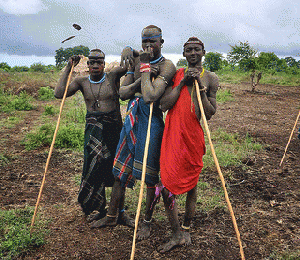Reprinted from www.theecologist.org
Institutional double-dealing by NGOs delivers a damaging twin blow to tribal peoples - first, their environment is destroyed by commercial activity, and then conservation projects deny them access to their surviving lands and resources.
In Paraguay's vast Chaco region, the familiar sounds of the forest are being drowned out by the rumble of heavy machinery.
"Where jaguars once trod, now there are just the tracks of bulldozers", protests Porai Picanerai, a member of the Ayoreo tribe.
His people are being chased from their ancestral lands by Brazilian corporation Yaguarete Pora. While some Ayoreo remain hiding in the forest, living in fear and isolation, those forced out are vulnerable to disease and illness.
The Chaco is experiencing rapid deforestation thanks to companies like Yaguarete Pora, who are illegally clearing vast swathes of land for cattle ranching. Ironically, having promised a small, protected nature reserve, they continue to oust the forest's most accomplished conservationists, its tribal people.
In spite of this, the company proudly flaunt the logo of the largest corporate responsibility initiative on the planet, the United Nations Global Compact.
This voluntary agreement advocates ten fundamental corporate responsibility principles, including the provision that "businesses should support and respect the protection of internationally proclaimed human rights."
Though Yaguarete clearly defy this responsibility, the Compact's lax membership requirements allow corporations to engage in bad practices while sporting the UN seal of approval.
Such is the hypocrisy of 21st century greenwashing. With pressure mounting on companies to endorse high standards of corporate responsibility, many are failing to deliver. To mask the truth, companies frequently greenwash their activities by participating in seemingly eco-friendly ventures that disguise the true extent of the environmental and human damage they are causing.
With conservation and intergovernmental organisations cosying up to big business, the greenwash is increasingly sophisticated, posing an ever-greater threat to the lives of tribal peoples. Because their livelihoods depend on their unique local environments, this greenwashing poses a grave threat to their survival.
Corporate greenwashing is destroying tribal peoples
The Aurora Pacific Economic Zone and Freeport (APECO) in Casiguran, the Philippines, is a 12,923 hectare area currently being developed into a self-sufficient commercial hub and special economic zone.
The project promises to bring "modernity with a touch of green" to Casiguran, boasting plans for eco-friendly features including a Marine Sanctuary and Mangrove Development Zone. For all this talk, the situation on the ground tells a dramatically different story.
If completed, APECO will strip 3,000 small farms and indigenous Agta households of their land. The Agta have reported intimidation, interrogation and assassination attempts relating to the project, which are further jeopardising a population already plagued by malnutrition and homicide.
What's more, APECO's 'green' promises appear entirely forgotten, as mangrove destruction and illegal logging are destroying the local ecosystem. The Agta's message is simple:
(Note: You can view every article as one long page if you sign up as an Advocate Member, or higher).





